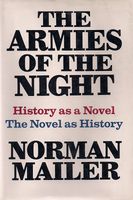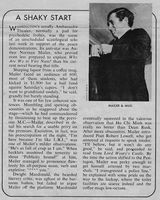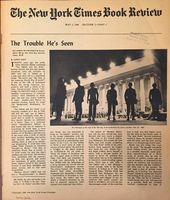68.8: Difference between revisions
(Added snippet.) |
(Tweaked gallery and added new image.) |
||
| Line 3: | Line 3: | ||
====''The Armies of the Night: History as a Novel, The Novel as History''. New York: New American Library, 6 May; London: Weidenfeld and Nicolson, October. Nonfiction narrative on the anti-war March on the Pentagon, 317 pp., $5.95.==== | ====''The Armies of the Night: History as a Novel, The Novel as History''. New York: New American Library, 6 May; London: Weidenfeld and Nicolson, October. Nonfiction narrative on the anti-war March on the Pentagon, 317 pp., $5.95.==== | ||
Dedication and acknowledgment: | Dedication and acknowledgment: “To [[Beverly Bentley|Beverly]]; An acknowledgment to Sandy Charlebois for work beyond the call of duty.” | ||
Published 20 years to the day after ''The Naked and the Dead'' ([[48.2]]). | Published 20 years to the day after ''The Naked and the Dead'' ([[48.2]]). | ||
Winner of the Pulitzer Prize for general nonfiction and the National Book Award for arts and letters. In 1999, it was ranked nineteenth on a list of the top 100 works of journalism of the twentieth century by 36 judges under the aegis of New York University's journalism department. See | Winner of the Pulitzer Prize for general nonfiction and the National Book Award for arts and letters. In 1999, it was ranked nineteenth on a list of the top 100 works of journalism of the twentieth century by 36 judges under the aegis of New York University's journalism department. See “Journalism’s Greatest Hits: Two Lists of a Century's Top Stories,” ''New York Times'', 1 March 1999, Business Section, pp. 1, 13. | ||
Discarded titles: | Discarded titles: “Bust at the Pentagon”; “The Armies of the Dead.” For an account of the work’s genesis and reception written by the editor of ''Harper’s'', see ''New York Days'' by Willie Morris (New York: Little, Brown, 1993), 213–222. | ||
Rpt: Entire narrative appeared earlier in two parts, in '' | Rpt: Entire narrative appeared earlier in two parts, in ''Harper’s'' ([[68.2]]), and ''Commentary'' ([[68.6]]), respectively and was then revised for book publication; [[98.7]] (partial). See [[68.26]], [[69.3]], [[69.4]], [[69.25]], [[69.26]], [[70.8]]–[[70.11]], [[72.7]], [[74.20]], [[79.14]], [[96.5]], [[13.2]], 381-94. | ||
{{cquote|There is no sex [in ''The Armies of the Night'']. In that sense, it's a nineteenth-century novel. It's courtly, it's deliberate, it's amused with its time and place. It's taken for granted that its characters are all very fine and substantial people. We know it's going to turn out well in the end. I suppose it has the restrained merriment of the early nineteenth-century picaresque novel.|author=Norman Mailer |source=[[82.16]]}} | {{cquote|There is no sex [in ''The Armies of the Night'']. In that sense, it's a nineteenth-century novel. It's courtly, it's deliberate, it's amused with its time and place. It's taken for granted that its characters are all very fine and substantial people. We know it's going to turn out well in the end. I suppose it has the restrained merriment of the early nineteenth-century picaresque novel.|author=Norman Mailer |source=[[82.16]]}} | ||
{{Gallery | |||
File:68-8.jpg | |width=200 | ||
File:68-8a.jpg|Snippet from ''Time'', October 27, 1967, that Mailer quotes at the beginning of ''AON''. | |height=200 | ||
</ | |align=left | ||
| File:68-8.jpg| | |||
| File:68-8a.jpg|Snippet from ''Time'', October 27, 1967, that Mailer quotes at the beginning of ''AON''. | |||
| File:68-8b.jpg|Review in ''NYT''. | |||
}} | |||
<div style="clear:both;"></div> | |||
== Bibliography == | == Bibliography == | ||
Revision as of 09:35, 2 April 2019
The Armies of the Night: History as a Novel, The Novel as History. New York: New American Library, 6 May; London: Weidenfeld and Nicolson, October. Nonfiction narrative on the anti-war March on the Pentagon, 317 pp., $5.95.
Dedication and acknowledgment: “To Beverly; An acknowledgment to Sandy Charlebois for work beyond the call of duty.”
Published 20 years to the day after The Naked and the Dead (48.2).
Winner of the Pulitzer Prize for general nonfiction and the National Book Award for arts and letters. In 1999, it was ranked nineteenth on a list of the top 100 works of journalism of the twentieth century by 36 judges under the aegis of New York University's journalism department. See “Journalism’s Greatest Hits: Two Lists of a Century's Top Stories,” New York Times, 1 March 1999, Business Section, pp. 1, 13.
Discarded titles: “Bust at the Pentagon”; “The Armies of the Dead.” For an account of the work’s genesis and reception written by the editor of Harper’s, see New York Days by Willie Morris (New York: Little, Brown, 1993), 213–222.
Rpt: Entire narrative appeared earlier in two parts, in Harper’s (68.2), and Commentary (68.6), respectively and was then revised for book publication; 98.7 (partial). See 68.26, 69.3, 69.4, 69.25, 69.26, 70.8–70.11, 72.7, 74.20, 79.14, 96.5, 13.2, 381-94.
| “ | There is no sex [in The Armies of the Night]. In that sense, it's a nineteenth-century novel. It's courtly, it's deliberate, it's amused with its time and place. It's taken for granted that its characters are all very fine and substantial people. We know it's going to turn out well in the end. I suppose it has the restrained merriment of the early nineteenth-century picaresque novel. | ” |
| — Norman Mailer, 82.16 | ||
Bibliography
Reviews
- Alvarez, A. (September 20, 1968). "Reflections in a Bloodshot Eye". New Statesman. pp. 351–352. Positive.
- Gilman, Richard (June 8, 1968). "What Mailer Has Done". New Republic. pp. 27–31. Positive.
- Kazin, Alfred (May 5, 1968). "The Trouble He's Seen". The New York Times. Books. pp. 1–2, 26. Retrieved 2017-08-27. Positive.
- Lipton, Lawrence (May 31, 1968). "Norman Mailer: Genius, Novelist, Critic, Playwright, Politico, Journalist, and General All-Around Shit". Los Angeles Free Press. pp. 27–28. Mixed.
- Macdonald, Dwight (1974). "Armies of the Night, or Bad Man Makes Good". Discriminations: Essays and Afterthoughts. New York: Grossman. p. 210–216. Positive.
- Maddocks, Melvin (May 10, 1968). "Norm's Ego is Working Overtime for YOU". Life. p. 8. Mixed.
- Morris, Willie (July 1968). "Norman Mailer's The Armies of the Night". Literary Guild Magazine. p. 15. Positive.
- O'Brien, Connor Cruise (June 20, 1968). "Confessions of the Last American". New York Review of Books. pp. 16–18. Retrieved 2018-11-07. Positive.
- Puzo, Mario (April 28, 1968). "Generalissimo Mailer: Hero of His Own Dispatches". Chicago Tribune. Book World. pp. 1, 3. Negative.
- Simon, John (1968). "Mailer on the March". Hudson Review. Vol. 21. pp. 541–545. Negative.
Essays
- Berthoff, Warner (1971). "Witness and Testament: Two Contemporary Classics". Fictions and Events. New York: Dutton. pp. 288–308. ISBN 0525104704.
- Gaitskill, Mary (1983). "This Doughty Nose: On Norman Mailer's An American Dream and The Armies of the Night". Somebody with a Little Hammer: Essays. New York: Pantheon. pp. 120–130. ISBN 9780307378224.
- Karl, Frederick R. (1983). American Fictions, 1940–1980. New York: Harper & Row. pp. 178–182. ISBN 0060149396.
- Lodge, David (1971). "The Novelist at the Crossroads". The Novelist at the Crossroads and Other Essays on Fiction and Criticism. Ithaca: Cornell UP. pp. 3–34. ISBN 0801406749.
- Lowell, Robert (September–October 1978). "A Conversation with Ian Hamilton". American Poetry Review: 23–27.
- Meredith, Robert (Autumn 1971). "The 45-Second Piss: A Left Critique of Norman Mailer and The Armies of the Night". Modern Fiction Studies. 17: 433–438.
- Middlebrook, Jonathan (Winter 1970). "Can a Middle-aged Man with Four Wives and Six Children Be a Revolutionary?". Journal of Popular Culture. 3: 565–574.
- Mosser, Jason (2009). "Genre-Bending in The Armies of the Night". Mailer Review. 3: 307–321.
- Piazza, Tom (2011). "Citizen Mailer". Devil Sent the Rain: Music and Writing in Desperate America. New York: Harper Perennial. pp. 213–221. ISBN 9780062008220.
- Seib, Kenneth A. (Spring 1974). "Mailer's March: The Epic Structure of The Armies of the Night". Essays in Literature. 1: 89–95.
- Taylor, Gordon O. (March 1974). "Of Adams and Aquarius". American Literature. 46: 68–82. Retrieved 2018-11-07.






